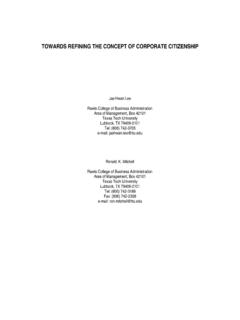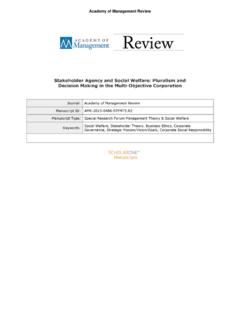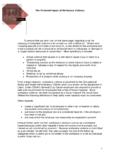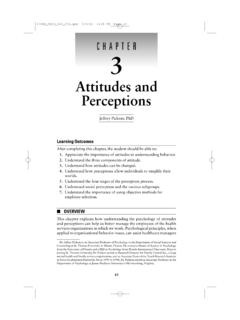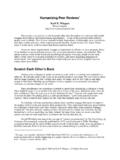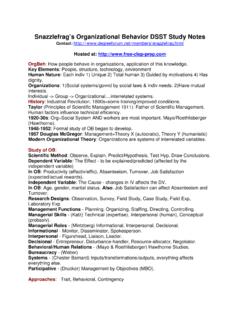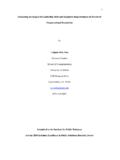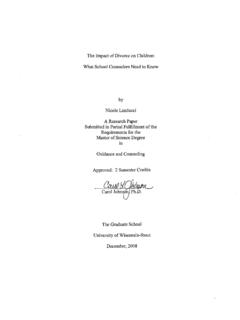Transcription of Job Security and Entrepreneurship: Enemies and …
1 Job Security and entrepreneurship : Enemies or Allies? Brandon Randolph-Seng Ronald K. Mitchell Alejandra Marin Jae H. Lee Executive Summary In a synthesis of the relevant social cognition, human resources, stakeholder, and entrepreneurship literatures, this article explores how perceptions about entrepreneurship affect entrepreneurial behavior and job Security seeking. Definit ions and reasons for the apparent incompatibility of entrepreneurship and job Security are analyzed, with the impact of cognitions about the two terms being addressed.
2 Next, a model of when and how entrepreneurship vs. traditional job seeking may be the chosen method of economic Security is proposed. This Steady State Model of Security Seeking in an Imperfect Economy describes a cyclical process in which individuals make three fundamental decisions concerning their economic Security . Finally, arguments are presented in support of the conclusion that entrepreneurship can reliably provide an alternative to the traditional job seeking means of obtaining economic Security . Keywords: Job Security , entrepreneurship , Self-efficacy, Social cognition As accepted for publication in: Journal of Applied Management and entrepreneurship January 2015 2 Job Security and entrepreneurship : Enemies or Allies?
3 You just felt like the world was unraveling. People started to sell and they sold hard. It didn t matter what you had you sold. - Ryan Larson (as quoted in Bajaj & Grynbaum, 2008) For stock market traders like Ryan Larson, the economic crisis of 2008 was life changing. The same could be said of many people throughout the world. One basic human need is a desire for economic Security ( , Stevens, 2001; De Cuyper, De Witte, Vander Elst, & Handaja, 2010) or, having provisions in store for an uncertain future (Durant, 1935, p.)
4 2; see also Greenhalgh & Rosenblatt, 1984; Direnzo & Greenhaus, 2011). Yet, central to all economic activity is transacting in an imperfect economy: one characterized by poor and weak governance structures and institutions (Arrow, Dasgupta, & Maler, 2003) and in which perfect, logical, and deductive rationality rarely prevails (Williamson, 1985; Rumelt, 1987; Arthur, 1994; Mitchell, 2004). Under the present status quo in developed economies, individuals are most likely to balance their need for economic Security in an imperfect economy by getting and keeping a stable job in an established organization (Maslow, 1954; Herzberg, Mausner, & Snyderman, 1959; Mitchell, 2001, 2004).
5 Yet, as the 2008 economic crisis has demonstrated (Garling, Kirchler, Lewis, & van Raaij, 2009; Yunus, 2009), and others have warned (see Mandel, 1996; Hytti, 2005), getting and keeping a stable job in an established organization is becoming a less and less reliable means of fulfilling the human need for economic Security (Dominitz & Manski, 1997). If seeking and keeping a stable job increasingly provides uncertain work Security , does the possibility exist for reliable alternative options? We posit that at least one possibility is emerging as an ever-more reliable alternative method of work Security , namely, entrepreneurship .
6 entrepreneurship entrepreneurship is widely seen as having a positive impact on the world s economy (Ireland & Webb, 2007). Not only do entrepreneurial actions produce new and innovative products and services for consumers and organizations (Covin & Miles, 1999), but also such actions produce new jobs and revitalize economies (Birley, 1986). Historically, entrepreneurship was defined as a means to attain economic Security . Since the noun entrepreneur, first entered language in the 15th century [originating with the French verb entrepreneur, in the 12th century (Hoselitz, 1951) connoting to do something ], the notion of undertaking independent economic action to attain greater prosperity (and thereby Security ) was understood (Cantillon, 1964/1755).
7 However in our modern day, entrepreneurship is often associated with risk, ambiguity (Knight, 1921; Venkataraman, 1997; Busenitz, 1999; Shane & Venkataraman, 2000), and failure (Venkataraman, van de Ven, Buckeye, & Hudson, 1990; McGrath, 1999; Shepherd, 2003). How then can something as rare and seemingly risky as entrepreneurship be a candidate for a reliable personal method of economic Security ? In order to clearly recognize how entrepreneurship can provide economic Security , an understanding of the process of economic Security seeking by individuals in developed economies is needed, which we discuss next.
8 JOB Security The desire for economic Security has become increasingly salient for many individuals and households since the 2008 economic crisis (see Garling et al., 2009). As mentioned above, in developed economies, individuals are most likely to balance their need for economic Security in 3 an imperfect economy by getting and keeping a stable job in an established organization (Maslow, 1954; Herzberg et al., 1959; Mitchell, 2001, 2004). Maslow explained that we can perceive the expressions of safety the common preference for a job with tenure and protection (1954, p.)
9 87), which is usually provided by an organization. Herzberg et al. defined job Security to include those features of the job situation which lead to assurance for continued emplo yment, either within the same company or wit hin the same type of work or profession (1959, p. 41). These perspectives imply that underlying the need for job Security is the pursuit of protection and continued employment within an organization. However, the volatile economy and organizational conditions have led workers in organizations to believe that psycho logical contracts are increasingly short term, transactional, and characterized by diminished trust in emplo yers (Herriot, Manning, & Kidd, 1997; Smithson & Lewis, 2000).
10 It is argued that because of the decline in job Security , individuals have shifted their focus away from the organization toward personal career development, causing employability to replace job Security as a primary value and driver behind career management decisions (Waterman, Waterman, & Collard, 1994; Iles, Forster, & Tinline, 1996; Galunic & Anderson, 2000; Grote & Raeder, 2009; Baruch, 2001; Benson, 2006; Berntson, Naswall, & Sverke, 2010). Useful in understanding an economic- Security -seeking method of obtaining and keeping a stable job is the concept of self-efficacy.
